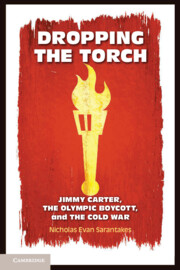Book contents
- Frontmatter
- Contents
- Acknowledgments
- Abbreviations
- Introduction Miracle on Ice
- Chapter 1 Lord Killanin and the Politics of the Olympics
- Chapter 2 Los Angeles versus Moscow
- Chapter 3 Jimmy Carter and U.S.-Soviet Relations
- Chapter 4 The Soviet Invasion of Afghanistan
- Chapter 5 The American Response
- Chapter 6 Easy Victories
- Chapter 7 Painful Losses
- Chapter 8 The White House Games
- Chapter 9 Coca-Cola, NBC, and the Defeat of the Iron Lady
- Chapter 10 The Vote in Colorado
- Chapter 11 Civil Wars
- Chapter 12 Carter versus Killanin
- Chapter 13 Moscow: The Olympics Are the Olympics
- Chapter 14 Los Angeles
- Chapter 15 Conclusion
- Epilogue
- Notes
- Bibliography
- Index
Chapter 5 - The American Response
Published online by Cambridge University Press: 05 September 2012
- Frontmatter
- Contents
- Acknowledgments
- Abbreviations
- Introduction Miracle on Ice
- Chapter 1 Lord Killanin and the Politics of the Olympics
- Chapter 2 Los Angeles versus Moscow
- Chapter 3 Jimmy Carter and U.S.-Soviet Relations
- Chapter 4 The Soviet Invasion of Afghanistan
- Chapter 5 The American Response
- Chapter 6 Easy Victories
- Chapter 7 Painful Losses
- Chapter 8 The White House Games
- Chapter 9 Coca-Cola, NBC, and the Defeat of the Iron Lady
- Chapter 10 The Vote in Colorado
- Chapter 11 Civil Wars
- Chapter 12 Carter versus Killanin
- Chapter 13 Moscow: The Olympics Are the Olympics
- Chapter 14 Los Angeles
- Chapter 15 Conclusion
- Epilogue
- Notes
- Bibliography
- Index
Summary
The question that faced the Carter Administration was how to react to the Soviet invasion. It was clear that the Americans would object and that U.S.-Soviet relations would suffer to some degree, but the Carter Administration had two important options. It could either see this intervention as a regional issue of limited importance outside Central Asia, or it could define this move as a major initiative in international affairs. Domestic political factors were always in play during this time and were the primary influences, rather than international considerations that shaped Carter’s decision. As things turned out, the boycott had significant impact on the international Olympic movement but very little on the situation in Afghanistan.
Most Americans saw the Soviet intervention in Afghanistan in dire terms – none more so than Brzezinski. He was the person most responsible for defining the administration’s view of the invasion. Soviet actions in Afghanistan only confirmed his hostile view of the Soviets. In assessing the strategic ramifications of this move, he looked not at the history of rivalry in Central Asia, but rather to the international confrontation that was the Cold War. For an American official, this view was predictable and probably understandable. Brzezinski decided, though, that this Soviet action was different than the ones that had come in East Germany, Hungary, and Czechoslovakia. “The Soviet occupation of Afghanistan is the first time since 1945 that the Soviet Union used its military forces directly to expand its power.” The intervention, direct though it may be, was in keeping with the increased aggression in Soviet foreign policy that the 1970s had witnessed. Brzezinski reminded Carter that “Afghanistan is the seventh state since 1975 in which communist parties have come to power with Soviet guns and tanks, with Soviet military power and assistance.”
- Type
- Chapter
- Information
- Dropping the TorchJimmy Carter, the Olympic Boycott, and the Cold War, pp. 75 - 94Publisher: Cambridge University PressPrint publication year: 2010



